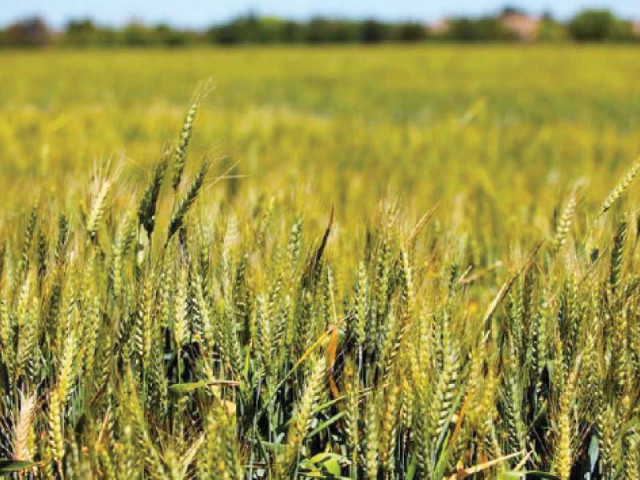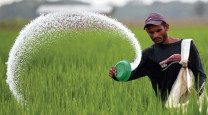Row over wheat purchase persists
World Bank seeks to cut procurement from farmers to take pressure off Punjab finances

World Bank has recommended millers to directly procure wheat from farmers that will save it from incidental charges. PHO-TO: FILE
The disagreement has resulted in slow progress on a $300 million loan programme that the World Bank had approved over two years ago. In its latest Implementation Status and Result report, the World Bank has retained “moderately satisfactory” rating of Punjab Agriculture and Rural Transformation Programme due to lack of progress in implementation of a key condition to reduce wheat stocks from six million to two million metric tons by end of next year.
“The World Bank and the client agreed to have an in-depth discussion on it during the upcoming mid-term review from August to October 2020 and reach a restructuring package to break the deadlock,” according to the report. As per the condition of the programme that the last Pakistan Muslim League-Nawaz (PML-N) government had agreed to, the provincial government will cut wheat procurements from six million metric tons in 2017 to just two million metric tons by December 2021.
Wheat purchase faces hurdles
However, the wheat stocks stood at 4.5 million metric tons as of April 17, 2020, showed the report.
The World Bank is asking the Punjab government that it should shelve the responsibility of procuring wheat from the farmers and providing to the wheat flour millers for grinding. The Washington-based lender has proposed that the provincial government should retain only two million strategic reserves that are sufficient to meet three months needs of the province.
It has recommended that the millers should directly procure the wheat from the farmers that will save it from heavy incidental charges, currently standing at Rs10,500 per metric tons. About 70% of the incidental charges are on account of interest payments to banks on the Rs425 billion loans that the Punjab government has taken to procure wheat from the farmers over the past many years.
Due to political and economic reasons, the Punjab government is not in a position to reduce procurements. A Wheat Inquiry Committee has recently pointed out serious flaws in the wheat operations that led to price crisis in the country. The provincial, as well as the federal governments, are not in a position to take political risks in an already charged environment. For the current season, the Economic Coordination Committee (ECC) of the Cabinet has set wheat procurement target at 8.2 million metric tons and 4.5 million or 55% of the target has to be procured by the Punjab government.
But there are apprehensions that a nexus exists between the millers and officials from Punjab Food Department that was benefiting from this huge wheat operations.
The World Bank has shared the way forward proposal with Pakistani authorities and suggested that the strategic reserves for the country should be maintained by the federal government and the provinces should pick incidental charges to the extent of their shares.
Due to these issues, the disbursements during past over two years stood at only $102.7 million or 34% as against the total loan amount of $300 million. Out of 18 indicators, 10 are so far partially achieved and four are not achieved at all, resulting in a delay in disbursement of the loan amount. An amount of $70.2 million is pegged with the reduction of wheat stocks and $10 million with food safety improvements.
The World Bank report stated that although there was a lack of progress in wheat market reforms, the Punjab government expressed the commitment to the general goal of wheat market reform. The World Bank and the government agreed to discuss restructuring the project during the upcoming mid-term review. The Punjab Food Department (PFD), which as per official statistics, manages 75% of wheat production of Pakistan. Punjab former chief minister Shehbaz Sharif had launched a five-year Strengthening Markets for Agriculture and Rural Transformation in Punjab programme (SMART).
Govt to curb wheat stockpiling with new plans
“The SMART implementation started in February 2018 and overall progress of the programme has been on track since then”, except on the issue of wheat procurement targets. The World Bank said that since October 2019, the programme made good progress on modernising agricultural markets, rolling-out an agricultural insurance system, and communications, beneficiary feedback, capacity building, and monitoring and evaluation.
The PAMRA Act (DLI 7) was approved by the Punjab Provincial Assembly on March 11, 2020. “The passing of Punjab Agriculture Marketing Regulatory Authority (PAMRA) Act symbolised a big step forward for Punjab in establishing well-functioning agriculture produce marketing system,” according to the World Bank report. The World Bank had approved the $300 million loan as part of the government of Punjab’s five-year $1.6 billion package to transform the agriculture and rural areas of the province.
The government of Punjab had constituted a committee to break the deadlock. However, so far no meeting of the committee has taken place.
Published in The Express Tribune, May 3rd, 2020.
Like Business on Facebook, follow @TribuneBiz on Twitter to stay informed and join in the conversation.



















COMMENTS
Comments are moderated and generally will be posted if they are on-topic and not abusive.
For more information, please see our Comments FAQ